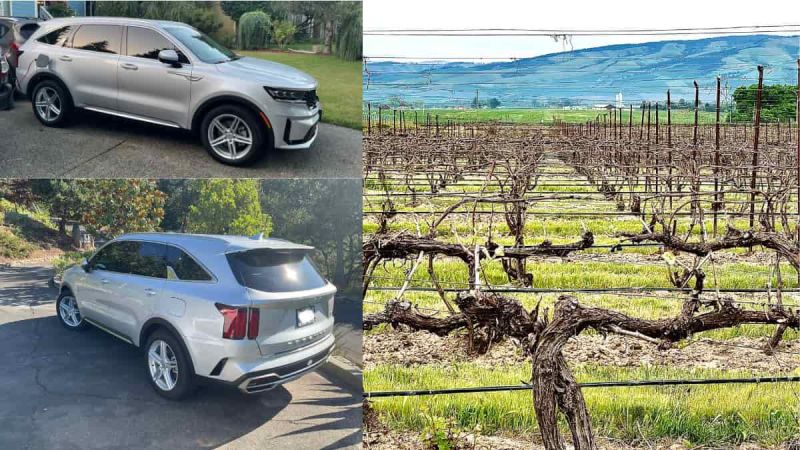I just revisited a drive from my home in the Seattle suburbs to Washington Wine Country (this time to both the Red Mountain AVA and Walla Walla AVA). On this trip though, I manually toggled between EV and hybrid modes pretty much the whole way in my Kia Sorento PHEV. I made a similar trip just over a month ago and saw significantly worse fuel efficiency. By comparison, on my outbound trip this weekend of just over 200 miles to our hotel in Richland, WA I got 39.5 MPG compared to my best on the former trip of 32.5 MPG, an improvement of over 20%. The primary reasons for the difference, in no particular order: I did not use Smart or Sport modes (for more than a few minutes anyway) and I had an average speed on this trip of 58.1 MPH compared to 63.6 MPH on the previous trip. The lower average speed this time was due primarily to a detour through downtown Ellensberg, WA as well as a lower max speed limit for the last hour of the drive. A few other differenced between the previous trip and this one are worth pointing out as they also tempered my efficiency figures:
- I had my all season tires on for this trip (which have lower rolling resistance)
- I had less weight in the vehicle (by about 250-300 lbs)
- I drove a different route that was slightly shorter and had a little less elevation change
Taken together, I expect that these situations (including the slower average speed) improved my efficiency. By manually toggling between hybrid electric (HEV) mode and all electric mode (EV), I saved my electric range for sections of the drive that were most advantageous, for example on roads sloping downhill or whenever we were driving less than 55 miles per hour. By maximizing the limited range of my PHEV’s battery in this way, I managed to get close to 40 miles on a full charge, mostly on the highway. But to be fair, I can’t know exactly how much the various factors affected the difference between the two drives, and as I stated in the previous articles I linked to here: sometimes the difference between the modes is so small it is within a margin of error. This is because I am not doing these tests in a laboratory, and the drives even when I am on the same routes and traveling as close to the same speeds as possible, are always affected by other factors, like headwinds, aerodynamic resistance, rolling resistance, vehicle weight, etc.
But back to the mechanics of the trip. On this drive I also used 3 full charges of my hybrid battery, one at home before leaving and two from the hotel we stayed at. The hotel charges came at no additional cost to me and were greatly appreciated. Over my entire ownership of the Sorento PHEV, I have managed to get a little over 20% of my charging for no cost (to me) by searching out free charging at hotels, wineries, places I visit and the kindness of friends and family members.
On the rest of our drive, between Richland, WA and Walla Walla, WA, and then between Richland, WA and our home in the Seattle Suburbs, I continued to manually toggle between EV and HEV modes and got about 38.1 MPG and 33.2 MPG on those respective legs (those figures are including the use of the hybrid battery as well). The drive to Walla Walla and back had about 400-500 extra pounds of weight compared to the first leg of the trip, and the drive home had a very stiff headwind of at least 20 MPH for about 75 miles (so both of those things negatively impacted my fuel efficiency), not to mention more uphill distance. My average speeds on all the other legs of the drive were about the same as the first, between 57 and 59 MPH (given the slower speed limits along the route). Overall, my fuel efficiency on this 557 mile trip was a about 37 MPG, but it was the first and second legs that best prove better efficiency from manually toggling between the EV and HEV functions of my PHEV,
Ultimately, the best way to get better MPG is to slow down, even just a little, and get to know the behaviors and characteristics of your vehicle's drive modes (assuming they have any). Through careful observation, I have seen that Sport mode often ends up revving the engine at a higher rate and Smart mode tends to use the battery in a less than optimal way. Both of those things diminish my PHEV’s overall efficiency. Forgoing the use of those modes (most of the time) and controlling my PHEV’s performance manually allows me to squeeze a few more miles per gallon or miles of range from its powertrain. Driving conditions can matter just as much, or more, as speed and the settings applied while we drive, at least until we learn to control the weather!
Do you have a hybrid vehicle that offers different drive modes? Have you experimented with them? What were your findings? Please share any questions or comments below.
Images courtesy of Justin Hart.
Justin Hart has owned and driven electric vehicles for over 15 years, including a first generation Nissan LEAF, second generation Chevy Volt, Tesla Model 3, an electric bicycle and most recently a Kia Sorento PHEV. He is also an avid SUP rider, poet, photographer and wine lover. He enjoys taking long EV and PHEV road trips to beautiful and serene places with the people he loves. Follow Justin on Torque News Kia or X for regular electric and hybrid news coverage.
Set as google preferred source











